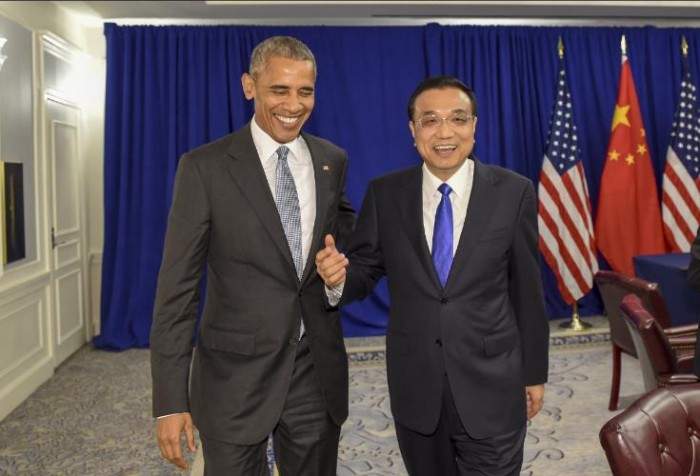
- Reuters reports: "U.S. President Barack Obama and Chinese Premier Li Keqiang agreed on Monday to step up cooperation in the United Nations Security Council and in law-enforcement channels after North Korea's fifth nuclear test, the White House said....U.N. diplomats say the two countries have started discussions on a possible U.N. sanctions resolution in response to the nuclear test earlier this month, but Beijing has not said directly whether it will support tougher steps against North Korea....'Both leaders condemned North Korea's September 9 nuclear test and resolved to strengthen coordination in achieving the denuclearization of the Korean Peninsula, including by invigorating cooperation in the United Nations Security Council and in law enforcement channels on North Korea,' a White House statement said."
The Wall Street Journal comments: "Even the harshest critics of authoritarian rule generally concede that when it comes to building infrastructure China wins hands down over the rich democracies. America has practically given up....Meanwhile, China can't build fast enough....But at what cost? A report by four academics at the University of Oxford's Saïd Business School has created a stir by arguing that what outside observers often hail as a towering strength of the Chinese system has instead led to colossal waste....Examining data on 95 road and rail projects, the authors say cost overruns are typically about the same as in democracies, and although China handily wins on speed it comes at the expense of quality, safety and the environment...If these failures are representative across the board, they not only suggest a Chinese financial blowup but challenge a conventional belief that the more you build the more you lower costs for businesses and households and add to economic growth. In China's case, infrastructure may be the road to ruin."
- Bloomberg Business reports: "The largest venture capital fund ever raised by a woman isn't in Silicon Valley or even the U.S. It's in Beijing and is run by a former librarian who keeps such a low profile that she's a mystery in her native China....Chen, 46, is part of an unusual group of female investors who have risen to the top of the venture business in China and helped fuel the country's technology boom. They've backed some of China's most successful startups and their influence is growing as they raise more money, recruit other women and seed the next generation of technology companies....Among the top U.S. venture firms, women make up about 10 percent of the investing partners and only half of the firms have any women of that rank. China is already more balanced: About 17 percent of investing partners are female and 80 percent have at least one woman. An increasing number, like Chen, lead their firms....Their success is bringing more women into China's technology industry. The Chinese government estimates females found 55 percent of new Internet companies and more than a quarter of all entrepreneurs are women. In the U.S., only 22 percent of startups have one or more women on their founding teams....'China is fundamentally different,' said Gary Rieschel, an American who founded the China-based Qiming Venture Partners, where four of the nine investing partners are female. 'The venture capital industry in the U.S. has been a private men's club. It has been much more of a meritocracy for women in China.'"
- 2016-09-19 China's debt crisis: Just how bad is it?
- 2016-09-18 China August home prices rise 9.2 percent year-on-year
- 2016-09-14 How China Wastes Its Renewable Energy
- 2016-09-13 Behind China’s Firewall, Google Maps Shows Nine-Dash Line
- 2016-09-12 Marriage Falls in China, Transforming Finances and Families
- 2016-09-11 China, Russia naval drill in South China Sea to begin Monday
- 2016-09-09 North Korea’s Nuclear Defiance Leaves China With Few Options
- 2016-09-08 Pressing Asia Agenda, Obama Treads Lightly on Human Rights
- 2016-09-07 Tensions over South China Sea belie summit cordiality
- 2016-09-06 Global leaders test limits of spreading wealth
- The New York Times China Announces Inquiry Into Company Trading With North Korea
- Reuters U.S., China to step up cooperation on North Korea
- The Wall Street Journal U.S., China Move Against Firm Suspected of Aiding North Korean Nuclear Program
- Bloomberg Business How Women Won a Leading Role in China's Venture Capital Industry
- The New York Times Samsung Says It Has Found No Battery Problem in China
- The Washington Post The Latest: US, China vow to cooperate on NKorea nuke threat
- Bloomberg Business Out of China's Dusty Northwest Corner, a Solar Behemoth Arises
- CNN The son of a Chinese billionaire bought his dog eight iPhone 7s
- The Washington Post Chinese film festival pushes for end to gender inequality
- BBC News China merger to create world's second largest steel firm
- Reuters China's OK clears last hurdle for Marriott's deal to buy Starwood
- The Financial Times Tesla sued in China over fatal crash
- The Wall Street Journal Hollywood Under Pressure to Put More Chinese Actors in the Spotlight
- The Wall Street Journal Is China Building a Road to Ruin?
- Reuters: Breakingviews China's startups have few good options left
- The Washington Post Beijing: What life is like in China's rapidly growing capital city
- The New York Times: Sinosphere Once a Voice of Young China, Han Han Stakes Out a Different Path
- The Wall Street Journal: China Real Time Samsung's Attempt to Douse China Firestorm Has Consumers Steaming
- Foreign Policy: Tea Leaf Nation Act Fast! This Can't-miss Investment in Shanghai Won't Last Long
- The Diplomat How China and Japan See Each Other in 2016
- Reason: Hit & Run Will We Build a Wall Against Chinese Immigrants, Too?
